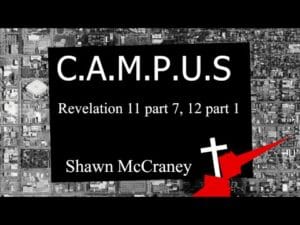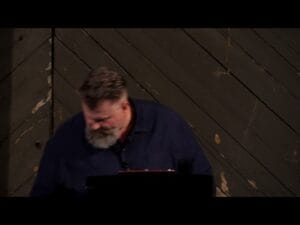
1 Corinthians 1:18-31 Bible Teaching
Shawn's teaching on 1 Corinthians 1:18-31 emphasizes God's use of the foolish and weak to confound the wise, highlighting humility over pride and spiritual wisdom over worldly wisdom.

Shawn's teaching on 1 Corinthians 1:18-31 emphasizes God's use of the foolish and weak to confound the wise, highlighting humility over pride and spiritual wisdom over worldly wisdom.

Paul emphasizes unity in Christ, discourages allegiance to human leaders, focuses on the Gospel's simplicity, and highlights salvation through Jesus' sacrifice.

Revelation 12's symbolic vision of a woman, child (Jesus), and dragon depicts cosmic battles, Jesus' resurrection, Satan's defeat, and believers' spiritual rebirth.

Shawn's teaching on Revelation 11:14-19 highlights the transition of worldly kingdoms to God's eternal reign, the role of Jesus, divine influence over history, and final judgment.

Paul and Shawn both emphasize unity among believers, focusing on love, avoiding divisions, and spiritual maturity. They stress moving from basic teachings to deeper understanding.

Paul's letter to Corinthians highlights gratitude for grace, spiritual enrichment, empowerment by the Spirit, living blamelessly, and intimate fellowship with Christ.

Shawn's teaching on Revelation highlights three woes as divine judgments for repentance, culminating in Christ's spiritual kingdom, countering materialistic views like Mormonism.

Shawn's teaching interprets Revelation 11 through a Preterist lens, linking the two witnesses to Jesus, historical events like the Jewish War, and the fall of Jerusalem in A.D. 70.

Shawn's teaching on 1 Corinthians emphasizes spiritual growth, historical context of Corinth, Paul's challenges, apostolic authority, and the importance of scripture over experiential religion.

Shawn's teaching suggests Jesus the son of Ananus as a potential fulfillment of Revelation 11's two witnesses, linking him to Jesus Christ through historical and biblical evidence.

Shawn's teaching covers prayer, scripture singing, and Acts study, focusing on Paul's Rome mission, his defense, and the spread of salvation to Gentiles, despite mixed responses.

Shawn's teaching on Revelation 11 highlights the symbolic measurement of true believers, the Roman siege of Jerusalem, and the debated identity of the two witnesses, linking historical and prophetic events.

Prayer and music set the tone for a verse-by-verse study of Acts 28:7-15. Shawn encourages independent thinking, questions Paul's lack of evangelism in Malta, and stresses spiritual encouragement and warfare.

Shawn's teaching integrates prayer, music, and a verse-by-verse study of Acts 27:39-44, focusing on Paul's shipwreck, survival, and divine protection, challenging superstitions.

Shawn's teaching links Revelation 10 and Ezekiel, focusing on the symbolic act of consuming a book, Israel's rebellion, and the timing of Revelation's writing before AD 70.

Shawn's teaching on Revelation 10 highlights Jesus as an angel with an open scroll, symbolizing a new spiritual Kingdom. It explores biblical accessibility post-Reformation, the mystery of God, and unity in Christ.

Shawn's teaching on Acts 27 highlights trusting God's plan amid life's chaos, using Paul's ship journey as a metaphor for faith, divine guidance, and universal care.

Shawn's teaching highlights Jesus' fulfillment of God's promises, spiritual over material reality, Christ as "Second Adam," unity of believers, and Revelation's prophetic messages.

Shawn's teaching on Acts 27:4-25 highlights Paul's voyage, navigating adverse winds, Euroclydon storm, God's assurance, life's unpredictability, and reliance on divine guidance.

Shawn's teaching highlights Revelation's spiritual kingdom, emphasizing trust in God, continuity from the Old Testament, and the kingdom's presence since 70 AD, not future events.